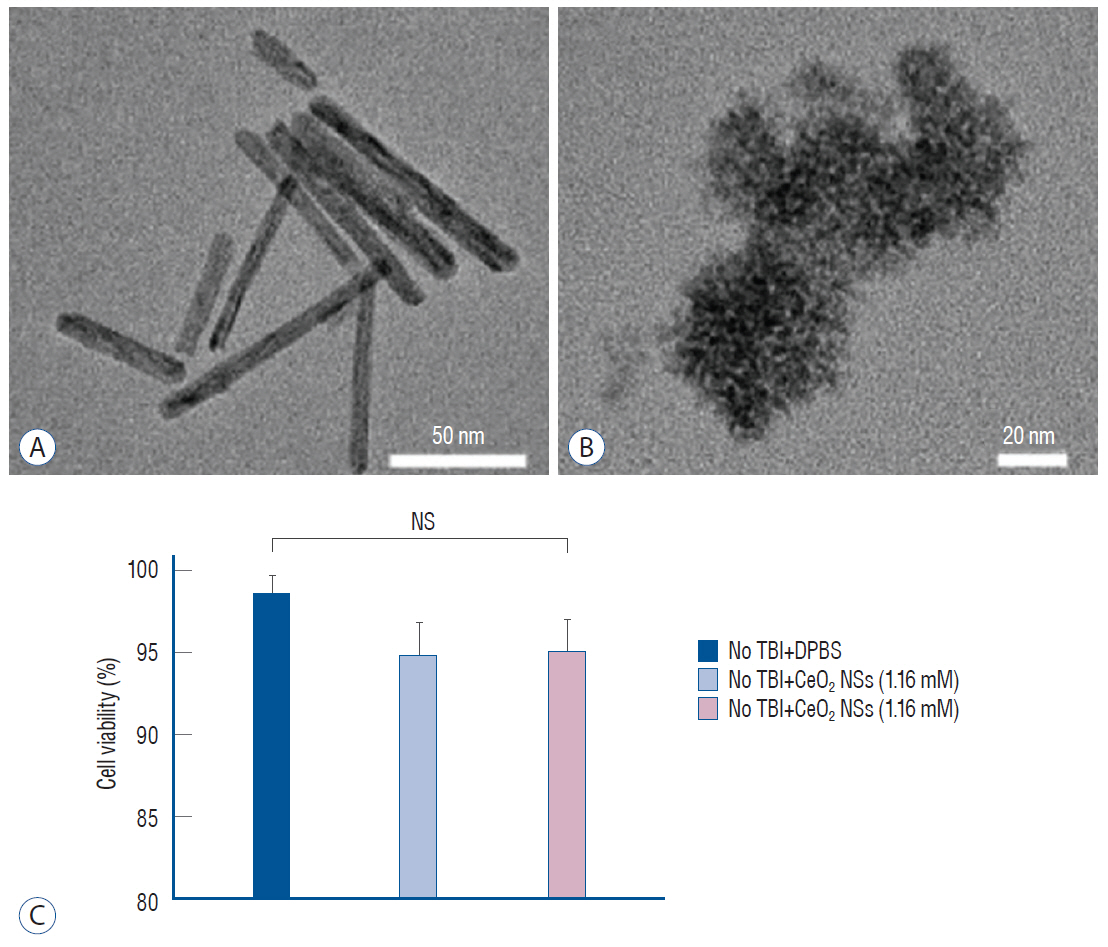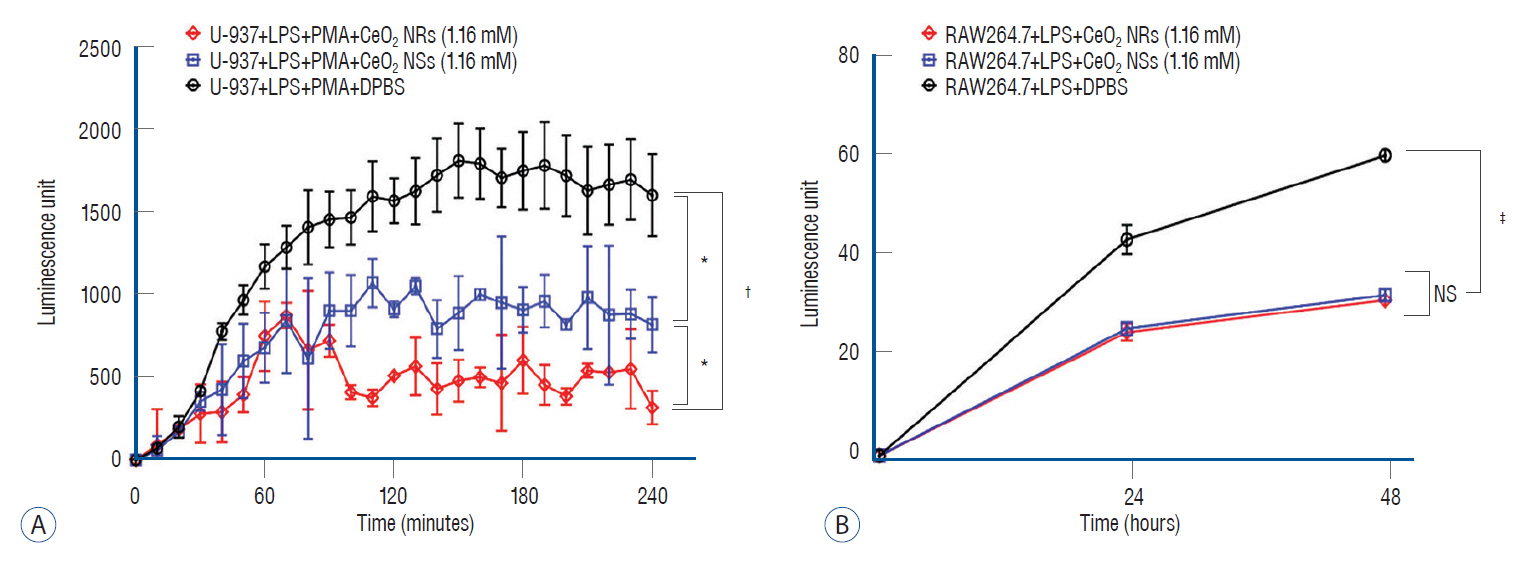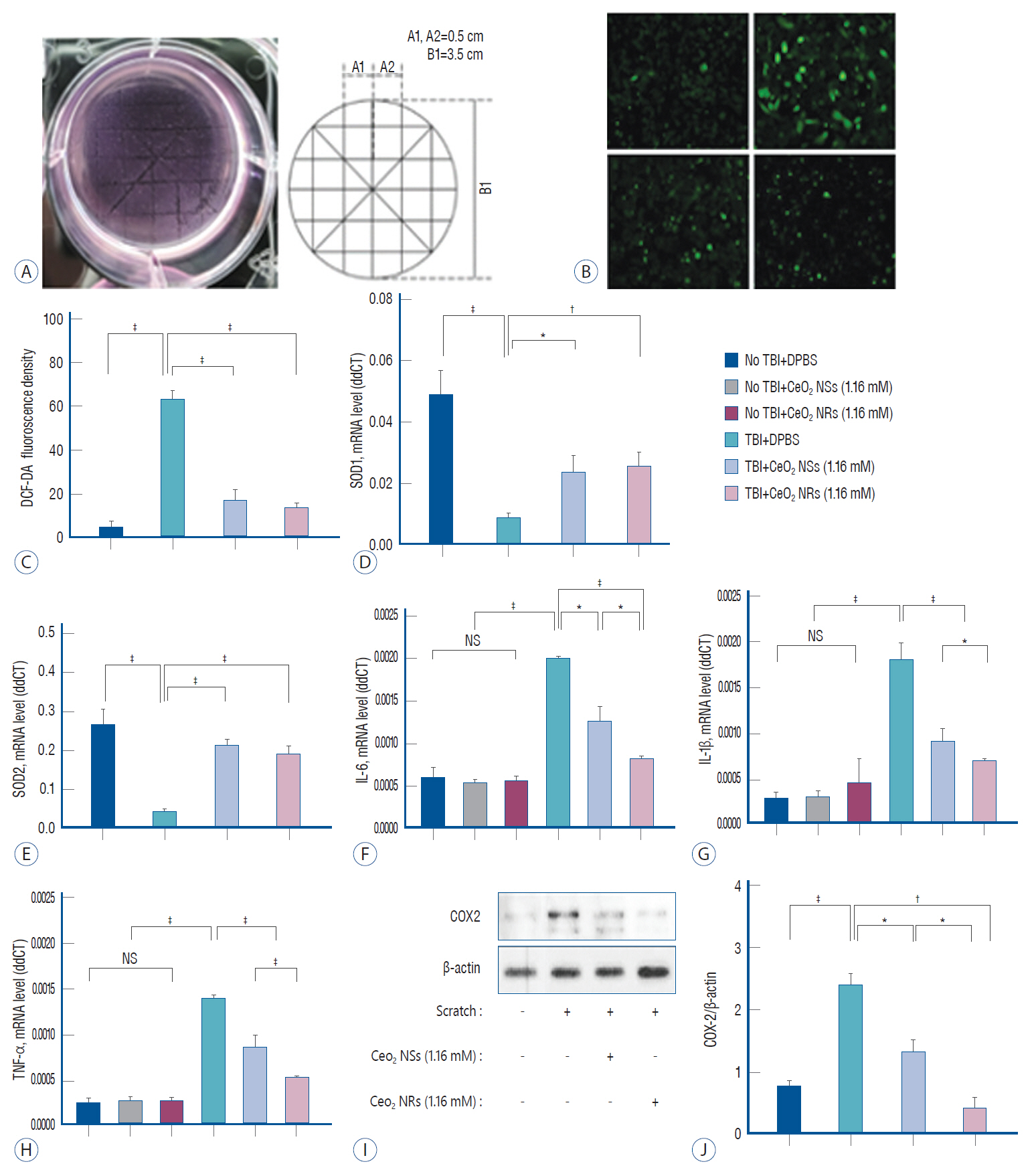J Korean Neurosurg Soc.
2022 Mar;65(2):196-203. 10.3340/jkns.2021.0185.
The Therapeutic Role of Nanoparticle Shape in Traumatic Brain Injury : An in vitro Comparative Study
- Affiliations
-
- 1Institute of New Frontier Research, Hallym University College of Medicine, Chuncheon, Korea
- 2Department of Materials Science and Chemical Engineering, Hanyang University, Ansan, Korea
- 3Department of Neurosurgery, Hallym University College of Medicine, Chuncheon, Korea
- KMID: 2527176
- DOI: http://doi.org/10.3340/jkns.2021.0185
Abstract
Objective
: To perform a comparative analysis of therapeutic effects associated with two different shapes of ceria nanoparticles, ceria nanorods (Ceria NRs) and ceria nanospheres (Ceria NSs), in an in vitro model of traumatic brain injury (TBI).
Methods
: In vitro TBI was induced using six-well confluent plates by manually scratching with a sterile pipette tip in a 6×6-square grid. The cells were then incubated and classified into cells with scratch injury without nanoparticles and cells with scratch injury, which were treated separately with 1.16 mM of Ceria NSs and Ceria NRs. Antioxidant activities and anti-inflammatory effects were analyzed.
Results
: Ceria NRs and Ceria NSs significantly reduced the level of reactive oxygen species compared with the control group of SH-SY5Y cells treated with Dulbecco’s phosphate-buffered saline. The mRNA expression of superoxide dismutases was also reduced in nanoparticle-treated SH-SY5Y cells, but apparently the degree of mRNA expression decrease was not dependent on the nanoparticle shape. Exposure to ceria nanoparticles also decreased the cyclooxygenase-2 expression, especially prominent in Ceria NR-treated group than that in Ceria NS-treated group.
Conclusion
: Ceria nanoparticles exhibit antioxidant and anti-inflammatory effects in TBI models in vitro. Ceria NRs had better antiinflammatory effect than Ceria NSs, but showed similar antioxidant activity.
Keyword
Figure
Reference
-
References
1. Alam Bony B, Kievit FM. A role for nanoparticles in treating traumatic brain injury. Pharmaceutics. 11:473. 2019.
Article2. Bailey ZS, Nilson E, Bates JA, Oyalowo A, Hockey KS, Sajja VSSS, et al. Cerium oxide nanoparticles improve outcome after in vitro and in vivo mild traumatic brain injury. J Neurotrauma. 37:1452–1462. 2020.
Article3. Baldwin SA, Fugaccia I, Brown DR, Brown LV, Scheff SW. Blood-brain barrier breach following cortical contusion in the rat. J Neurosurg. 85:476–481. 1996.
Article4. Dall’Acqua P, Johannes S, Mica L, Simmen HP, Glaab R, Fandino J, et al. Functional and structural network recovery after mild traumatic brain injury: a 1-year longitudinal study. Front Hum Neurosci. 11:280. 2017.
Article5. Hamm RJ, Temple MD, Pike BR, Ellis EF. The effect of postinjury administration of polyethylene glycol-conjugated superoxide dismutase (pegorgotein, Dismutec) or lidocaine on behavioral function following fluid-percussion brain injury in rats. J Neurotrauma. 13:325–332. 1996.
Article6. Jeong HG, Cha BG, Kang DW, Kim DY, Ki SK, Kim SI, et al. Ceria nanoparticles synthesized with aminocaproic acid for the treatment of subarachnoid hemorrhage. Stroke. 49:3030–3038. 2018.
Article7. Kadry H, Noorani B, Cucullo L. A blood-brain barrier overview on structure, function, impairment, and biomarkers of integrity. Fluids Barriers CNS. 17:69. 2020.
Article8. Kaur P, Sharma S. Recent advances in pathophysiology of traumatic brain injury. Curr Neuropharmacol. 16:1224–1238. 2018.
Article9. Khatri N, Thakur M, Pareek V, Kumar S, Sharma S, Datusalia AK. Oxidative stress: major threat in traumatic brain injury. CNS Neurol Disord Drug Targets. 17:689–695. 2018.
Article10. Kim CK, Kim T, Choi IY, Soh M, Kim D, Kim YJ, et al. Ceria nanoparticles that can protect against ischemic stroke. Angew Chem Int Ed Engl. 51:11039–11043. 2012.
Article11. Maas AI, Murray G, Henney H 3rd, Kassem N, Legrand V, Mangelus M, et al. Efficacy and safety of dexanabinol in severe traumatic brain injury: results of a phase III randomised, placebo-controlled, clinical trial. Lancet Neurol. 5:38–45. 2006.
Article12. Marshall LF, Maas AI, Marshall SB, Bricolo A, Fearnside M, Iannotti F, et al. A multicenter trial on the efficacy of using tirilazad mesylate in cases of head injury. J Neurosurg. 89:519–525. 1998.
Article13. Najem D, Rennie K, Ribecco-Lutkiewicz M, Ly D, Haukenfrers J, Liu Q, et al. Traumatic brain injury: classification, models, and markers. Biochem Cell Biol. 96:391–406. 2018.
Article14. Nance E, Zhang F, Mishra MK, Zhang Z, Kambhampati SP, Kannan RM, et al. Nanoscale effects in dendrimer-mediated targeting of neuroinflammation. Biomaterials. 101:96–107. 2016.
Article15. Nelson BC, Johnson ME, Walker ML, Riley KR, Sims CM. Antioxidant cerium oxide nanoparticles in biology and medicine. Antioxidants (Basel). 5:15. 2016.
Article16. Pan A, Zhu T, Wu HB, Lou XW. Template-free synthesis of hierarchical vanadium-glycolate hollow microspheres and their conversion to V2O5 with improved lithium storage capability. Chemistry. 19:494–500. 2013.
Article17. Rodríguez-Rodríguez A, Egea-Guerrero JJ, Murillo-Cabezas F, Carrillo-Vico A. Oxidative stress in traumatic brain injury. Curr Med Chem. 21:1201–1211. 2014.
Article18. Rzigalinski BA, Meehan K, Davis RM, Xu Y, Miles WC, Cohen CA. Radical nanomedicine. Nanomedicine (Lond). 1:399–412. 2006.
Article19. Torrente-Murciano L, Gilbank A, Puertolas B, Garcia T, Solsona B, Chadwick D. Shape-dependency activity of nanostructured CeO2 in the total oxidation of polycyclic aromatic hydrocarbons. Appl Catal B. 132-133:116–122. 2013.
Article20. Youn DH, Tran NM, Kim BJ, Kim Y, Jeon JP, Yoo H. Shape effect of cerium oxide nanoparticles on mild traumatic brain injury. Sci Rep. 11:15571. 2021.
Article21. Zavvari F, Nahavandi A, Shahbazi A. Neuroprotective effects of cerium oxide nanoparticles on experimental stress-induced depression in male rats. J Chem Neuroanat. 106:101799. 2020.
Article22. Zhang M, Li J, Li H, Li Y, Shen W. Morphology-dependent redox and catalytic properties of CeO2 nanostructures: nanowires, nanorods and nanoparticles. Catal Today. 148:179–183. 2009.
Article23. Zhao Y, Luo P, Guo Q, Li S, Zhang L, Zhao M, et al. Interactions between SIRT1 and MAPK/ERK regulate neuronal apoptosis induced by traumatic brain injury in vitro and in vivo. Exp Neurol. 237:489–498. 2012.
Article24. Zhou K, Li Y. Catalysis based on nanocrystals with well-defined facets. Angew Chem Int Ed Engl. 51:602–613. 2012.
Article




